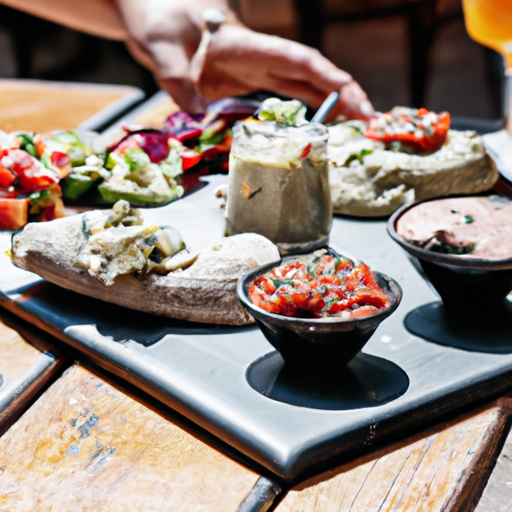Are you a food lover looking to explore new and exciting culinary scenes? In this article, we will be discussing the topic of exploring the next great food cities. You can expect to learn about some up and coming destinations that are rapidly gaining popularity among foodies. From mouth-watering dishes to unique dining experiences, we will take a closer look at what makes these cities the next big thing in the world of food and wine. So, get ready to embark on a gastronomic adventure like no other!
Exploring the Next Great Food Cities
In a world where food has become a cultural phenomenon, there is an ever-growing demand for unique culinary experiences. While established food cities like New York and Paris have long been heralded as gastronomic capitals, a new trend is emerging – the rise of the next great food cities. These up-and-coming destinations offer a vibrant local food scene, diverse culinary offerings, and are gaining recognition from food critics and publications.
Defining the concept of next great food cities
The term “next great food cities” refers to cities that are experiencing a culinary renaissance, where the food and dining scene is thriving and gaining significant attention from both locals and visitors. These cities offer an abundance of culinary talent, unique flavors, and an environment conducive to fostering culinary innovation.
Factors that contribute to a city becoming a food destination
Several factors contribute to a city’s rise as a food destination. Firstly, a thriving local food scene is essential. This includes a network of farmers, artisans, and chefs who work together to create a sustainable and vibrant culinary ecosystem. Additionally, diverse culinary offerings that reflect the city’s history, culture, and ethnic diversity also play a significant role in attracting food enthusiasts.
Recognition from food critics and publications is another crucial factor. Positive reviews and accolades from renowned food critics and publications not only validate a city’s culinary scene but also attract a broader audience who are seeking new and exciting dining experiences.

Characteristics of an Emerging Food City
emerging food cities often possess certain characteristics that set them apart from other destinations. A thriving local food scene is at the core of these cities, where farmers’ markets, artisanal producers, and local restaurants showcase the region’s culinary offerings. The support for locally sourced ingredients and sustainable practices further contributes to the city’s appeal.
Moreover, these cities typically boast diverse culinary offerings. From street food vendors to upscale restaurants, emerging food cities embrace a range of cuisines, allowing visitors to explore a multitude of flavors and culinary traditions. This diversity creates a dynamic and immersive dining experience.
Recognition from food critics and publications solidifies a city’s reputation as an emerging food destination. When esteemed food critics or renowned publications highlight the culinary talents and unique offerings of a city, it sparks curiosity among food enthusiasts and encourages them to visit and experience the city’s gastronomic delights themselves.
Exploring the Up-and-Coming Food City: [City Name]
The city of [City Name] exemplifies the characteristics of an emerging food city. Its food and culinary culture have been steadily gaining recognition and attracting food enthusiasts from around the world.
Overview of [City Name]’s food and culinary culture
[City Name] has embraced its local ingredients and culinary traditions to create a vibrant and distinct food culture. From street-side vendors serving up traditional dishes to avant-garde restaurants pushing the boundaries of culinary innovation, the city offers a diverse range of culinary experiences.
Notable restaurants and chefs
The city is home to a myriad of talented chefs and innovative restaurants that showcase the region’s unique flavors and culinary influences. From Michelin-starred establishments to hidden gems tucked away in local neighborhoods, [City Name] offers something for every palate.
Signature dishes and cuisine
[City Name]’s cuisine draws inspiration from its cultural heritage and natural surroundings. Local specialties and signature dishes highlight the region’s culinary identity and reflect the city’s evolving food landscape. From delectable seafood dishes to farm-to-table creations, the city’s cuisine is an exciting blend of tradition and innovation.

Factors Behind the Rise of [City Name]
Several factors have contributed to the rise of [City Name] as an emerging food city. Economic and cultural influences have played a significant role in shaping the city’s food landscape. The availability of quality ingredients and a strong support network of local producers have created an ecosystem conducive to culinary innovation.
Investments in food infrastructure, such as culinary schools and incubator programs, have also played a pivotal role in nurturing local talent and fostering culinary creativity. These initiatives provide aspiring chefs and entrepreneurs with the tools and resources needed to succeed in the competitive food industry.
Support from the local government has been instrumental in [City Name]’s rise as a food destination. By introducing policies that promote local food production and culinary entrepreneurship, the government has created a supportive environment that encourages growth and innovation in the food sector.
Food Tourism in [City Name]
Food tourism is flourishing in [City Name], attracting visitors who are eager to explore the city’s culinary offerings. The city offers a wide range of attractions for food enthusiasts, from traditional markets and food halls to farm tours and cooking classes.
Food and wine festivals are another highlight of [City Name]’s culinary scene. These festivals celebrate the city’s diverse flavors and offer a platform for local producers and chefs to showcase their talents. Visitors can indulge in tastings, attend cooking demonstrations, and immerse themselves in the city’s gastronomic culture.
Food tours and culinary experiences are also popular among visitors to [City Name]. These immersive experiences provide an opportunity to explore the city’s neighborhoods, discover hidden culinary gems, and learn about the history and culture that shape [City Name]’s food scene.

Impact of Food Tourism on [City Name]
Food tourism has had a significant impact on [City Name], contributing to its local economy and creating job opportunities in the food and hospitality industry. The influx of visitors has provided a boost to local businesses, from restaurants and food producers to hotels and transportation services.
The growth of food tourism in [City Name] has also facilitated cultural exchange and preservation. Visitors are not only indulging in the city’s culinary delights but also gaining a deeper understanding of its culture and traditions. This exchange of ideas and experiences helps to preserve and promote the unique culinary heritage of [City Name].
Challenges and Opportunities for [City Name]
As [City Name] continues to grow as a food destination, it faces several challenges and opportunities. Maintaining authenticity amidst globalization is a significant concern. As the city gains international recognition, there is a risk of diluting its culinary identity. However, by embracing innovation while staying true to its roots, [City Name] can strike a balance between attracting global influences and preserving its local flavors.
Balancing growth with sustainability is another challenge. As the popularity of [City Name] as a food destination increases, there is a need to ensure that the city’s culinary scene remains sustainable and supports local producers. Collaboration between local businesses and communities can help foster this sustainability, ensuring that the city’s culinary offerings thrive for years to come.

Lessons from Established Food Cities
Looking to established food cities can provide valuable lessons for [City Name] as it continues to develop its culinary scene. Case studies of successful food cities highlight the importance of supporting local food producers and engaging with the community. By creating a strong network of farmers, artisans, and chefs and involving them in decision-making processes, [City Name] can foster a sense of ownership and collaboration that will benefit its culinary scene.
Strategies for fostering culinary innovation can also be drawn from established food cities. Encouraging experimentation, providing resources for research and development, and supporting culinary education are all crucial in nurturing a thriving food scene. By investing in these areas, [City Name] can continue to push the boundaries of culinary creativity and attract food enthusiasts.
The Future of Food Cities
The future of food cities looks promising, with trends and predictions pointing to continued growth and evolution. Technology and social media will continue to play a significant role in shaping the food landscape, allowing for increased accessibility and awareness of emerging food cities.
As food culture evolves, there will be a greater emphasis on sustainability and ethical practices. Local sourcing, reduction of food waste, and the promotion of environmentally conscious dining experiences will become increasingly important factors in determining the success of emerging food cities.

Conclusion
The rise of the next great food cities offers exciting opportunities for food enthusiasts to explore unique culinary experiences beyond the traditional gastronomic capitals. Through a combination of a thriving local food scene, diverse culinary offerings, and recognition from food critics and publications, cities like [City Name] are establishing themselves as culinary destinations.
By supporting local businesses, embracing innovation, and fostering collaboration between the food industry and communities, emerging food cities can continue to thrive and contribute to their local economies. As food enthusiasts, it is essential to explore and support these culinary destinations, encouraging their growth and ensuring the continued evolution of food culture.



